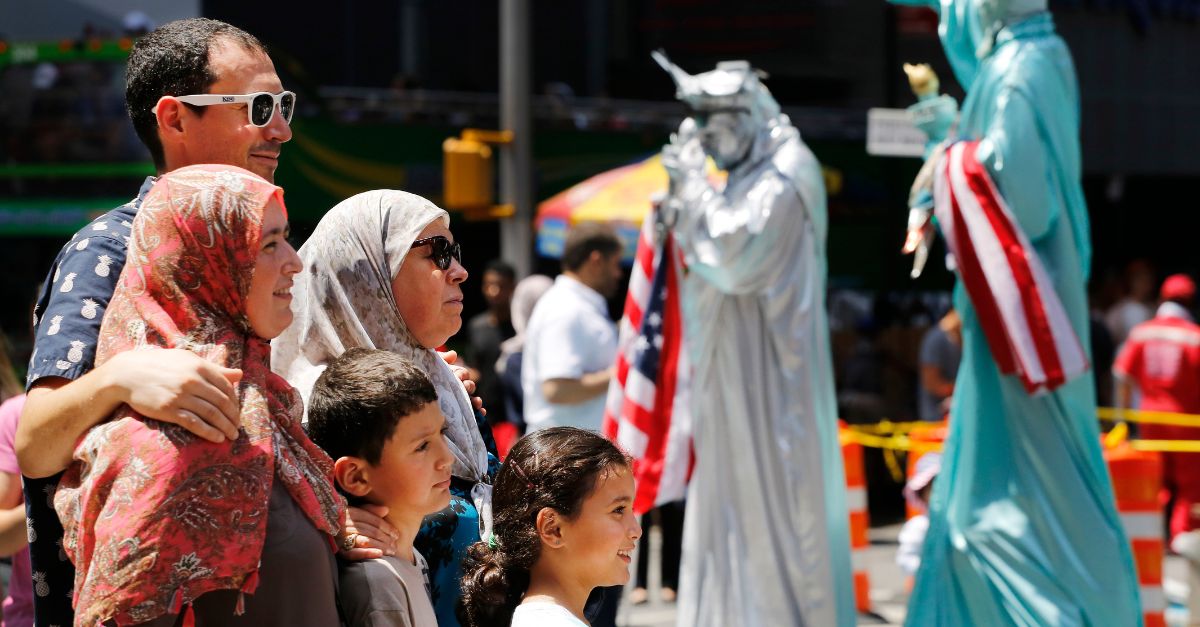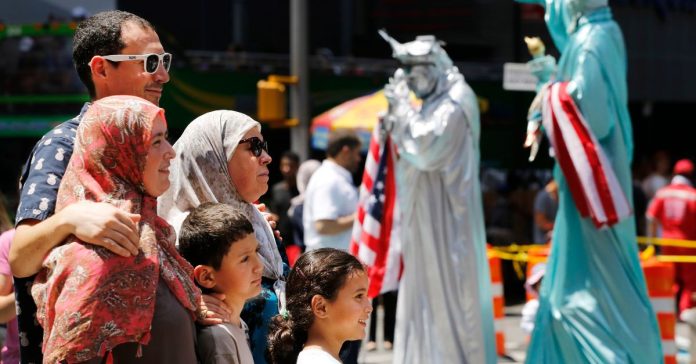
A Muslim family poses for photos, Sunday, July 17, 2016, in New York’s Times Square. Behind them are Statue of Liberty characters. (AP Photo/Mark Lennihan)
After thousands of women were forced to remove their hijab, or religious head covering, for their booking photos, a $17.5 million settlement agreement has been reached with the city of New York to pay the class action plaintiffs.
The lawsuit began in 2018 when two Muslim women, Jamilla Clark and Arwa Aziz, said they were forced to remove their hijab before New York Police Department officers took their booking photos after they were arrested. The garment is traditionally considered a religious in nature and for many Muslim women it is considered a mandatory aspect of their faith and something they must wear, in particular, in the presence of men so that they are not defiled.
Clark, who was arrested for violating what she called a “bogus protective order filed by her abusive ex-husband” in 2018, had her hijab pushed down around her shoulders before her photo was snapped. It left her sobbing, feeling “naked” and humiliated, the original complaint notes.
Aziz was arrested for allegedly violating a restraining order that she said was made against her by a “vindictive sister-in-law.” This happened eight months after Clark’s arrest and like Clark, Aziz had her hijab forcibly removed before her booking photo was taken. Aziz said police took the photo of her without her head covering in full view of several male officers and at least 30 male inmates. She also sobbed, her attorneys said. Aziz said she offered to pull her hijab further back from her hairline so that her face was more visible a, but officers refused to make the accommodation before taking her photo and adding it to the police database.
Over 3,600 women, according to the class action, were forced to undergo similar treatment in recent years and have their booking photos memorialized as such in the database. According to the lawsuit, in 2015, the New York Police Department had only just changed its policy for inmates with religious head coverings, not just wearers of hijabs, because of lawsuits alleging religious freedom violations during forced removals. Prior to that period, the department policy for head coverings was largely a discretionary practice.
The 2015 interim order on the department dictated that inmates could now simply push back the head covering from the edges of their face instead of removing it. Removal would only be required for the inspection of contraband and if it was to be done, it was only to occur in a private room and be conducted by an officer who is the same gender as the inmate.
The plaintiffs said this was never formally incorporated in the police department’s guidance, however.
With the long-running civil litigation now settled, attorneys for the plaintiffs say they expect members of the class action to qualify for compensation of anywhere from $7,000 to $13,000 per person. The settlement agreement covers anyone affected between March 16, 2014, through Aug. 23, 2021.
A review of the federal court docket in the Southern District of New York on Monday does not yet show a finalization of the agreement by U.S. District Judge Analisa Torres, an appointee of former President Barack Obama.
An attorney for the plaintiffs did not immediately respond to a request for comment but a spokesperson for the police department, Nicholas Paolucci, said last week that the deal struck a careful balance between the NYPD’s “respect for firmly held religious beliefs with the important law enforcement need to take arrest photos.”
Though the total settlement agreement comes to $17.5 million, the terms indicate it will be closer to $13 million for plaintiffs to share after attorneys fees and other administrative costs are assessed.
“Money can’t fully undo this trauma, but it sends a powerful message that the NYPD can’t violate New Yorkers’ First Amendment rights without paying a price,” said plaintiffs’ attorney Albert Fox Cahn.
Cahn is also the director of the nonprofit group, Surveillance Technology Oversight Project, an organization that advocates for the end of “mass surveillance” by local governments and focuses on “the discriminatory impact of surveillance on Muslim Americans, immigrants, the LGBTQ+ community, indigenous peoples, and communities of color, particularly the unique trauma of anti-Black policing,” according to its website.
Have a tip we should know? [email protected]

